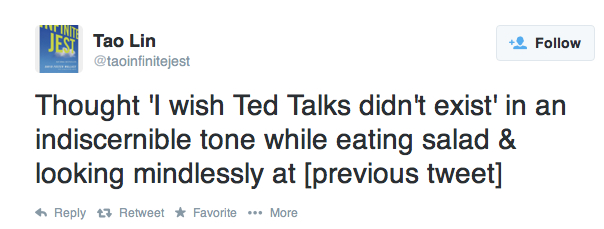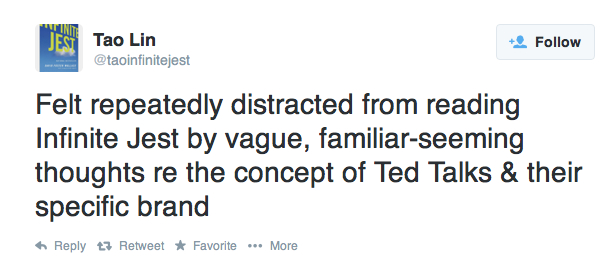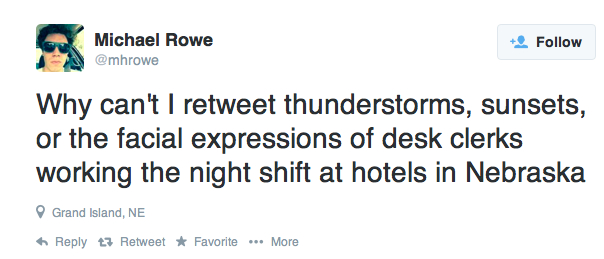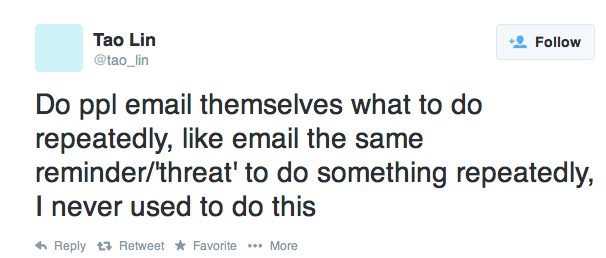the destroyer > reviews > On Twitter and Gramsci / Anne Marie Wirth Cauchon
ANTONIO GRAMSCI AND THE TWITTER OF COMPASSION

Maybe it was the words: Tweet, Twitter, Trending, Follow. Or maybe it was the length: 140 characters, a length too reminiscent of a Fox News sound bite or a cruel command. Whatever it was, I was a long-time Luddite holdout, a non-tweeter, a Twitter atheist. But my unbelief has been checked and replaced with a cautious interest in the literary—and therefore social and cultural—possibilities of Twitter, thanks to the work of Antonio Gramsci, an invalid and Communist intellectual (concerned with, among many other things, the shortcomings of State Communism) imprisoned by Mussolini from the late 1920s to early 1930s until days before his death. Is this Italian Communist a strange bedfellow for a reconsideration of Twitter, a key feature of the global, information-based economy? Perhaps. After all, even for Gramsci’s own time, his work was far from global in its scope since it was severely checked—and, simultaneously, rendered unique—by the small prison library and the books deemed acceptable by prison officials for acquisition by a political prisoner. Though limited in more canonical works, the prison library was replete with those by popular Italian writers of the 1920s and 30s. And for contemporary readers of Gramsci—readers looking in the pages of the Prison Notebooks for insights about daily life, literature, and politics that might have been overlooked in the past but could prove indispensable for today’s warming, warring globe—this is where Twitter comes in. Though writing long before the advent of the internet, Gramsci’s serious and nuanced writings on the popular, often ‘common’ literatures of his era relates intuitively to contemporary, popular literary forms. What’s more, his egalitarian approach offers a theoretical base for those of us interested in ensuring an ongoing, vibrant popular literature, one that embraces its ‘common’ contemporary forms, including Twitter. With a return to Gramsci the question is no longer: “Is Twitter popular literature?” but rather becomes: “If Twitter is popular literature, how must we write it so that it can best serve its readers and writers?”

In his Prison Notebooks Gramsci makes apparent his belief in a daily, popular literature with lines like this: “literature must be simultaneously an actual element of culture (civilization) and a work of art (beauty).” That is to say, literature can’t only be beautiful, but must also be an embedded social and political practice that both reflects and affects the real world. Twitter certainly fits this general description, with tweets that report breaking headlines or soccer scores, those that act as one-line poems, and even those that lead to friendships starting online and continuing in the real world. Used by Twitter followers for information, for literary expression, and for community building (among other things), Twitter is certainly an “actual element of culture,” an (often) integral part of daily life, one as connected to the body as a wristwatch—especially considering our increasingly frequent use of smartphone technology. Given the way of the world in 2014, Twitter may be a more effective literary form than, for example, the novel. After all, the novel requires long stretches of time devoted exclusively to its study, much to the detriment of other tasks like shopping, catching up on work emails, exercising, diaper changing, juicing and/or cleansing, etc.

Sarcasm aside, the literature that Gramsci supports—whether novels, poetry, or, by extension, Twitter—is not the same as commercially popular literature. In fact, he critiques commercial literature for being inadequately—or falsely—linked to daily experience. As he puts it: “What makes it ‘commercial’ is the fact that the ‘interesting’ element is not ‘candid,’ ‘spontaneous,’ intimately fused with the artistic conception; rather, it is sought after from the outside, mechanically, as a sure element of immediate ‘success.’” All right, so Twitter is ostensibly candid and spontaneous. That’s its raison d’être, its “artistic conception.” But as suggested in a recent Elle interview with Diane von Furstenburg regarding her line of Google Glass glasses and sunglasses, there is a divide in the world of Twitter between true spontaneity and the appearance of it. Diane Von Furstenburg opts for true spontaneity and says: “‘One of the things about the tweet and Instagram is the impulse, right? It’s about the moment, and it’s incredible that you can put something in the universe as you feel it.”’ But as Elle’s Fashion News Director Anne Slowey rejoins: “I’m too insecure to project everything I think and feel into the universe without a copy editor and a fact-checker having my back.” As Slowey’s prudent comment suggests, for much of Twitter a market-based etiquette and decorum preside, wherein tweets are mediated and produced, as Gramsci puts it “mechanically, as a sure element of immediate ‘success,’” whether for personal, political, artistic, or economic gain.

So, the kind of Twitter for which Gramsci might advocate is not one based on formulas for ‘success’—1,000 retweets, a jump in book sales, an increase in client base. The kind of Twitter for which Gramsci might advocate really would be spontaneous, in line with Diane Von Furstenburg’s vision, and it wouldn’t get you anything concrete. But Gramsci’s Twitter wouldn’t be limited to spontaneity. Instead, it would likely share one of his political aims: “to bestir the great multitudes out of passivity… [to know] the sentiments of the great masses through ‘coparticipation,’ through ‘compassionality.’” Here, Gramsci advocates for a collective politics constructed by and based on the “immediate particulars” of collective life, a politics that requires politicians’ active engagement in—and learning from—the realities of working people’s daily experience. Similarly, a Gramscian literature wouldn’t come from isolated individuals but would emerge collectively from “compassionality” (which I define as compassion and collective passion) and from “coparticipation” (which I define as collective participation) aimed to “bestir the great multitudes out of passivity.” That means us. The great, passive multitudes. And beyond spontaneity, compassion, collective passion, and “coparticipation” are almost what Twitter is made of, rendering it an excellent candidate for a revived literary form in the tradition of Antonio Gramsci.

So, let’s take a step back. It’s a nice line: “bestir the great multitudes out of passivity.” But what, again, does this dead Communist have to do with Twitter? Besides the intuitive, intellectual links, I think the substance of the connection comes from something Gramsci couldn’t foresee, something I alluded to at the beginning, something we all know: weather patterns are changing, ice caps are melting, and humanity is poised on the precipice of disaster. Which means something for us all, right now. And so Twitter daily proves itself to be an unorthodox literary form that is collectively produced, pervasive, and intimately fused to the particulars of our daily lives—a literary form already set up as a place to start changing our thinking and acting together with a quickness only the Internet can provide. Candid compassion, passion, and “coparticipation” are perhaps even more crucial now than under the Italian fascists, since only collective thinking and acting can get us out of the mess we’ve made of the planet with our obsessions with immediate success. And as Gramsci periodically reveals, literature—and so Twitter—is as good a place as any to begin, collectively, to bestir ourselves out of passivity.








